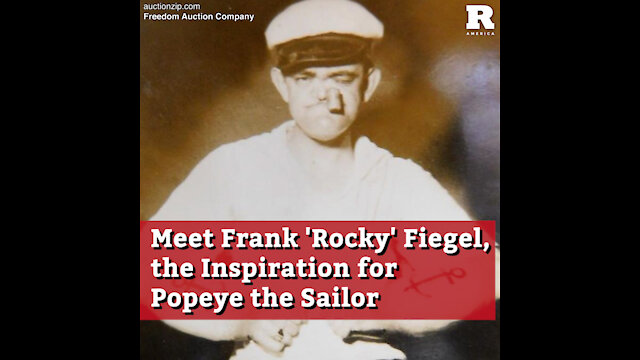Premium Only Content

Meet Frank 'Rocky' Fiegel, the Inspiration for Popeye the Sailor
The Popeye cartoon character is based around the life of a ‘muscly’, squinty-eyed sailor name Popeye the Sailor Man. The comic was created in the late 1920s by E.C. Segar. and is based on someone Elzie Segar knew in Illinois.
The Popeye the Sailor Man character debuted in The Thimble Theatre comic strip in 1929. He was a minor character hired by character couples ‘Olive Oyl’ and ‘Hamgravy’ (her fickle boyfriend) to be apart of a ship’s crew. While he was only meant to be around for a few strips, the Popeye character quickly became very popular and the focus of the strip. The originally unimpressed and at times fickle, Olive Oyl became Popeye’s girlfriend. Popeye finds a baby in the mail which he adopts and names Swee’Pea.
So who exactly is Popeye based after? Well, the man who Elzie Segar knew in Illinois was named Frank “Rocky” Fiegel. He was known as a “local” legend. He was strong and demonstrated it in the many fights he was in. Like his the character, “Rocky” smoked a pipe and was toothless, Segar took a few other liberties. Fiegel was more of a drinker than a spinach eater, and he was a bartender, not a sailer.
He was, however, said to be very kind to children-a characteristic Popeye was given as well. Recently statues have been raised of the other local character inspirations. Rumor has it that Fiegel wasn’t really aware of his role in the creation of our favorite character Popeye until his final years of life, passing away in 1947. An engraving of Popeye’s face is on his gravestone. A statue of him (Popeye) was raised in Chester, Illinois in his honor.
Paramount Pictures adopted the strip character into the Popeye the Sailor animated cartoon in an agreement with Max Fleischer of Fleischer Studios and King Features in 1932. Popeye’s popularity continued to rise, making these cartoons some of the most successful in the 1930s. William Costello was the original voice of Popeye. The most well-known voice (laugh and mumbles) for the character was Jack Mercer. Mae Questel, the voice of Betty Boop, was the voice of Olive Oyl, while Gus Wickie voiced Bluto.
This Fleischer Studios production was where the “spinach” trope became heavily emphasized. It was only spoken of from time to time in the comic strip. In an unfortunate turn of events, Paramount Pictures fired Fleischer Studios and began running the cartoon and others under their newly created Famous Studios. These cartoon shorts are currently owned by Turner Entertainment and distributed by its very own sister company, Warner Bros.
See more at rare.com
-
 1:31
1:31
Rare
4 years agoPatrick Swayze Didn’t Let Cancer Stop Him From Acting
44.1K1 -
 6:16
6:16
AnimeFury
4 years ago $0.01 earnedDrawing Sailor Pluto
87 -
 58:29
58:29
WMAR
4 years agoOff-the-Grid: Inspiration in Adversity
51 -
 0:06
0:06
NFLmemes
4 years agoFrank the tank
54 -
 1:15
1:15
Logan1977
4 years agoBe a sailor
18 -
 59:49
59:49
The Soul of the EveryMan
4 years agoSoul of the Everyman - Inspiration
18 -
 2:32
2:32
AccessRedemption
4 years agoHope~Access Redemption; Instant Inspiration
55 -
 2:22
2:22
AccessRedemption
4 years agoAccess Redemption ~ instant Inspiration
66 -
 2:27
2:27
KSHB
4 years agoFrank Clark on Carolina win
26 -
 1:03
1:03
Fetrente
4 years agoG randfather sailor sings in the street
43